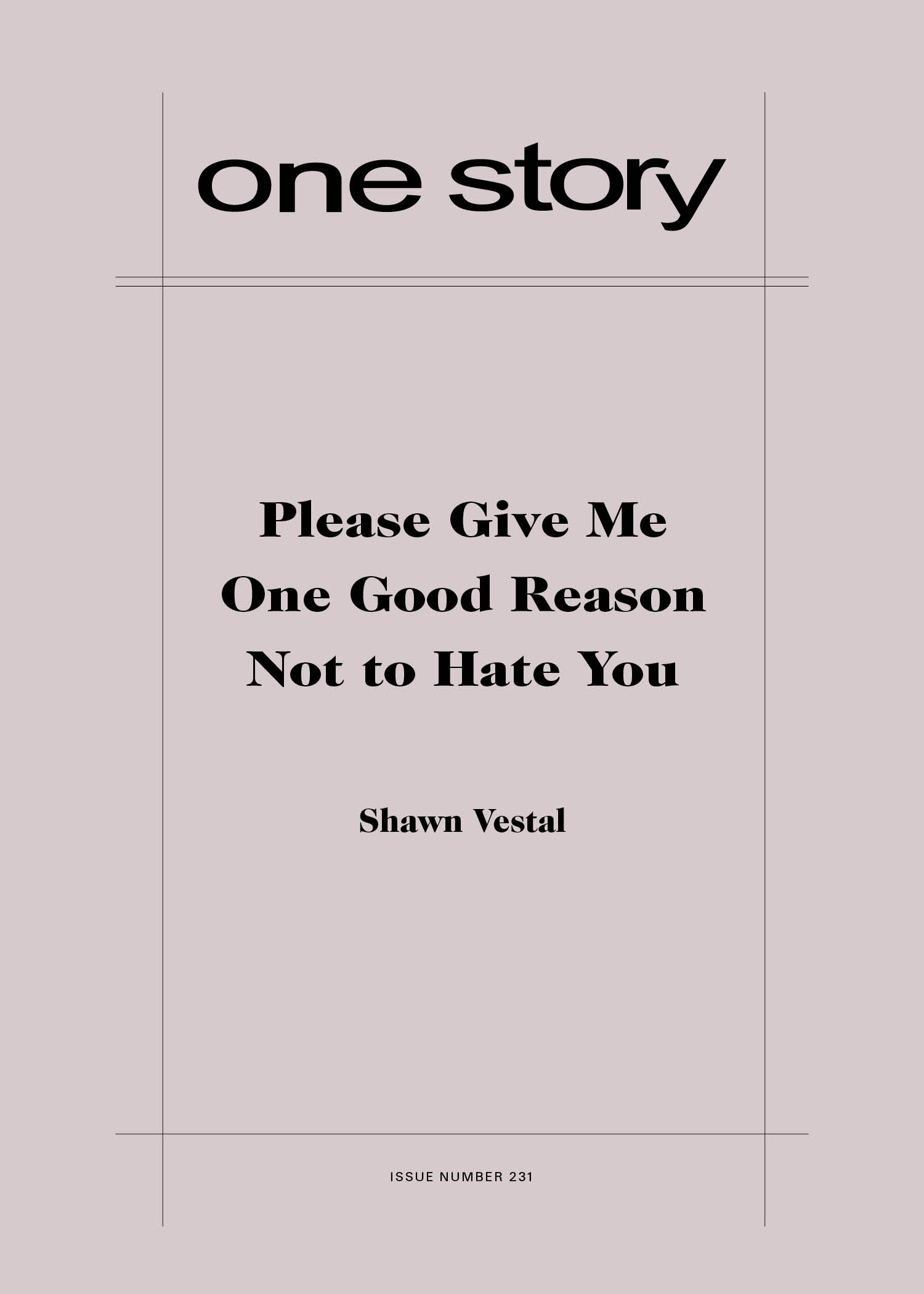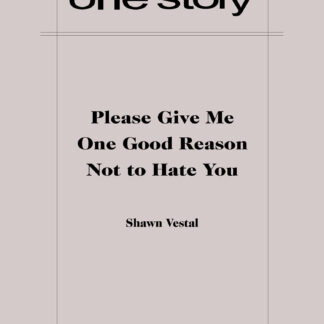
Please Give Me One Good Reason Not to Hate You
$2.50
147 in stock
Excerpt
Here is what matters: Wide-open days without surprise. A well-managed series of expectations. New people and a simple story and a relentless memory for all I have said about myself and all I have not.
The backpacking trip was Tina’s idea, and only because it was Tina’s idea did I even consider it. It was late, over wine and dirty dishes, and she said, “Let’s just stop talking about it and do it!” Four days, three nights in the Canadian Rockies. A little fancy time in Banff, before and after. At first everyone was all I’m not sure, and maybe so, and let me see, but then Amber said, “Come on already, you fucking pussies!” That’s the way wilderness works here. As an obligation. A point of honor. People are always comparing the elevation gains of their hikes. They display fly rods like art. Entire dinner parties are built on discussions of Shimano derailleurs or cutting backpack weight. It’s goddamned oppressive, is what it is, but Tina loved all that shit, she really did, and I was starting to feel like a moderately moral but lazy German during the early days of the National Socialist Party: it was harder to resist than go along.
Shawn Vestal
Shawn Vestal is the author of Daredevils, a novel published in 2016, and Godforsaken Idaho, a collection of short stories that won the 2014 PEN/Robert W. Bingham Prize for debut fiction. His stories have appeared in Tin House, Ecotone, McSweeney’s, The Southern Review, and other journals. He lives with his wife and son in Spokane, Washington, where he writes a regular column for The Spokesman-Review and teaches in the Eastern Washington University MFA creative writing program.
Will Allison on “Please Give Me One Good Reason Not to Hate You”
“I arrived in Bozeman after the place that came after Animas, was thinking I would stay forever—thinking I would finally stop what I’ve been doing and be someone, thinking this place was really me.” So says Benny, the semi-likable sleazeball who narrates Shawn Vestal’s brilliant new story “Please Give Me One Good Reason Not to Hate You.”
The thing is, Benny isn’t really his name. “Benny” is just the latest in a string of identities he has fashioned as a small-time scam artist crisscrossing the American West. Also, it’s not just the scams that keep Benny on the move. It’s people—his overpowering need to be among them and apart from them. You might say Benny is alternately addicted to and allergic to his fellow man. It’s an internal tug-of-war that so far has guaranteed him a life of perpetual unfulfillment.
But Bozeman—beautiful Bozeman, Montana—is going to be different. Bozeman is the place, Benny comes to believe, where he’ll finally settle down, fit in, and take a chance on normal human happiness. To that end, despite being out of shape and hopelessly un-outdoorsy, Benny accepts an invitation to go on a four-day, forty-four-mile mountain hike with a quartet of hip thirty-somethings—including his sort-of ex-girlfriend and her new boyfriend.
If that sounds like a bad idea, you’re right, especially given Benny’s gift for self-sabotage. It doesn’t help that he’s a liar, a criminal, and a misanthrope. But whether you end up rooting for Benny or against him, we think you’ll agree that his story is one of the funniest, most compelling, and most daringly original works to grace our pages.
Q&A by Will Allison
- WA: Where did the idea for this story come from?
- SV: I didn’t really have an idea to start with. I had a title, for some reason. The phrase occurred to me as something to write toward, or under, as something that might have different possible resonances: Who is hating or trying not to hate whom? I then slowly entered the story the way I often do, trying to create a scenario and a character in need of a story, almost like a puzzle, an inch at a time—writing into complication, which I am then forced to write out of. I began to draw on certain details from my own experience (such as being a not-quite-outdoorsy-enough resident of the truly lovely town of Bozeman, Montana) and certain preoccupations I have as a fiction writer (such as lying, and the creativity involved in constructing a self) and then chipping away at the story, a little bit at a time for months.
- WA: I suspect many readers will view the narrator, Benny, as a monumental creep. What considerations come into play when writing about a less-than-likable protagonist?
- SV: I am very much drawn as a writer toward characters like Benny: sleazeballs who I am interested in trying to get the reader to actually care about, if not like, exactly. Or maybe even like. I suspect it must come from a deep well of self-loathing, this instinct to try to redeem, if only just a tiny bit, these lousy men. As a reader, it’s the kind of experience I appreciate the most—when my attitude toward the character is always being challenged, when I am tugged away from whatever assumptions I might have about the character, toward liking that person a little less or a little more than I was. I understand that lots of people want a character to like or root for. I want to make characters that you might want to root for in some moments and against in others. Or root for despite yourself. And so I wanted Benny to have certain characteristics that might shade his dishonesty: a sense of humor and self-awareness, and a desire for love and connection. On some level, I think, this is what we all are: people of questionable goodness who mostly want to be loved.
- WA: As much of a jerk as Benny is, he’s also very funny. Can you talk about the role of humor in your work?
- SV: I like humor that doesn’t sit right—that adds to a mixture of emotions that are as unsettling as entertaining. So, for example, one of the ways I tried to make Benny funny was in the meanness of his judgments of others. It’s not very nice, but it’s amusing, I hope—a complicated kind of humor, and maybe one that a reader can’t feel entirely virtuous about sharing.
- WA: The thing that most intrigued me about Benny is the tug-of-war inside him: his need to be among people versus his misanthropic tendencies. Was that how you imagined him from the outset, or did you discover this aspect of his personality as you were writing the story?
- SV: I think I discovered it as I wrote and expanded, and then changed, the story. I often plot my stories by writing one version and discovering that it doesn’t work, and then thinking about why that is, and what kinds of events might occur that would be more interesting and in tune with the character. I wrote earlier versions of the story in which things went in different directions, but I knew I needed to find a different set of incidents to make more dramatic sense. So I thought more about who Benny was and how those events would need to grow out of, or fit sensibly inside of, some central human need. His attitude is an extreme version of my own—and, I suspect, that of many people—which is that sometimes it’s great to be around people, and sometimes it’s so very liberating to not be, to be an anonymous person in an unknown place. As I wrote the story, this moved to the forefront in terms of his character, and then I expanded the world of what happens to reflect it as well.
- WA: During the editorial process, you made several line edits on your own, fine-tuning the prose with extraordinary care and precision. Can you discuss the relationship between your prose, at the word and sentence level, and the story as a whole?
- SV: I can get lost in line work, changing this word, cutting that phrase. I rework my stories a lot, or at least much more than I used to. I tend to write first passages in big, blowsy, undisciplined blasts and do a lot of shaping, cutting, and revising thereafter. Some of that operates above the level of the line, obviously, but eventually I get to a point where I have a hard time not messing with the sentences continually. There is some Platonic prose rhythm in my head that I am writing toward, and that I believe is vital to preserving the skin of the dream and preventing the reader from waking up—and I never really feel my prose gets there. Every time I look at something I’ve published, I wish I could open it up and do more nip/tuck.
- WA: How long did it take you to complete this story?
- SV: I started the story last year in July and finished the final edits a few months ago, so about ten months. In practice, that meant a few weeks when I was primarily focused on this story, followed by letting it sit and cool in my mind and then returning to it and revising it—doing all of that several times.
- WA: You write a column for Spokane’s newspaper, The Spokesman-Review, and you’ve published nonfiction in The New Yorker and elsewhere. Does your work as a journalist influence your fiction, and/or vice-versa?
- SV: I suspect these two practices speak to each other in ways I don’t fully recognize. Mostly, what I’m aware of is swinging between styles. A good part of my week is spent doing argumentative journalism, which I love—gathering facts, interviewing people, reading documents, and then trying to make a cogent, persuasive argument about it. I particularly love blasting away at stupidity and falseness in public life, in trying to peel the skin off the lies of the powerful. It’s a very ripe time for that. The rest of my writing life is reveling in freedom from fact and striving more toward understanding than judgment—I come to fiction ready to bounce around and play. Doing both makes for a very sustaining writing life.
- WA: What are you working on now?
- SV: I have a several short stories in various stages of completion/revision, and I’m in the early stages of working on another novel.
- WA: What is the best bit of advice about writing you have ever received?
- SV: On this question, I often think of the most pedestrian stuff imaginable: work hard, revise rigorously, read a lot, find a trusted reader/editor. On the other hand, I also respond to advice that is open-ended and vague, rather than prescriptive—because it makes me empowered to obey my impulses. What kind of advice, after all, would have prompted Kafka to write “A Country Doctor”? Or Lydia Davis to write “The Cows”? When I teach, I’m always referring to Flannery O’Connor’s comment: “It’s always wrong, of course, to say that you can’t do this or you can’t do that in fiction. You can do anything you can get away with, but nobody has ever gotten away with much.” I also have been gripped with something Davis said in an interview a couple of years ago: “Never tell a dream straight.”
